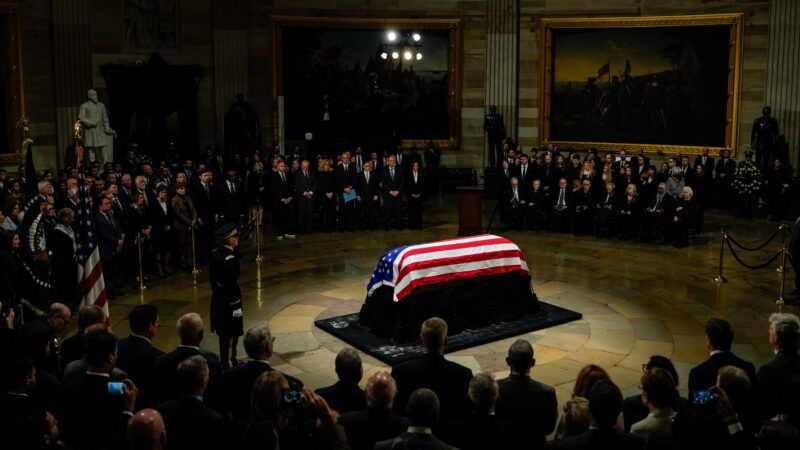Thank Jimmy Carter for Cheap Airfare
And also smartphones and FedEx, all of which were made possible by his push to abolish bad regulations.

Social media is replete with memes showing photos from the glory days of airline travel, where well-dressed travelers—think scenes from the TV show "Mad Men"—reclined in comfy seats, drank wine, and ate cooked meals. It's a huge disconnect from our modern airline experiences, which are punctuated by surly crowds, automated systems, and long TSA lines.
The point of the social-media photos: Look at how good things were then and how awful they are now. Like all nostalgia, they contain a ring of truth but are mostly nonsense. Airline travel prior to 1978, when President Jimmy Carter spearheaded the Airline Deregulation Act, was a high-end affair. I was a teenager in the early '70s when my parents took us to Florida. It was nice, but the flight was an enormous expense for my public school teacher Dad.
Some of the travel differences are cultural. I can't imagine anyone 50 years ago going anywhere—let along on a cross-country trip—dressed in glorified pajamas and sandals. (As an aside, no one is stopping you from donning a stylish suit for your trip to Denver.) Cultural standards change, and not always for the better. The 9-11 terrorist attacks permanently changed the way airports treat "customers."
But then Carter listened to Cornell University economics professor Alfred E. Kahn and eliminated a regulatory system by which the Civil Aeronautics Board determined airfares and routes. Carter, who died recently at age 100, was trying to tame inflation. There was little downward pressure on prices because bureaucrats set the rules.
Before deregulation, a cross-country flight could cost thousands of dollars (inflation adjusted) and would take all day. Afterward, travelers benefited from myriad choices that dropped prices and promoted innovation in scheduling and aircraft design.
It's not as bougie to fly these days, but almost everyone can now afford to do it. Yet the nostalgia never ends. "The professor obviously never talked to passengers, pilots, flight crews, investors and airline executives," author Rene Henry argued last year. "All were happy with regulation and the way things were."
Of course, passengers, pilots, airline executives, and investors liked the old system. Passengers were usually wealthy or engaged in business travel. Airlines didn't have to worry about upstart competitors. Investors were largely guaranteed a huge return. For the rest of Americans, well, they were stuck taking Greyhound or driving. The number of airline travelers increased from 383 million in 1970 to 4.4 billion today.
Carter is better known for some of his failures (the Iran hostage crisis, the inflationary period during his presidency, and his re-election loss). I cast my first vote for Carter in 1980, but supported Ronald Reagan in 1984, so I still remember the sense of "malaise" that defined the era. Carter also is widely remembered for his decency, the peace he brokered between Israel and Egypt, and his post-presidential charitable work.
Those are all noteworthy. I'd argue that his de-regulatory achievements—and it applied to far more than airlines—makes him one of the most consequential presidents in modern history given the impact of his reforms on our economy and freedoms.
Airline deregulation "was the first thorough dismantling of a comprehensive system of government control since the Supreme Court declared the National Recovery Act unconstitutional in 1935," Kahn later wrote. "It also was part of a broader movement that, with varying degrees of thoroughness, transformed such industries as trucking, railroads, buses, cable television, stock exchange brokerage, oil and gas, telecommunications, financial markets, and even local electric and gas utilities."
Yes, Carter also signed laws deregulating trucking, rail, and telecommunications, which paved the way for transformative innovations that have vastly improved our lives. "He set up cabinet-level oversight councils to review the new agencies' most important regulatory proposals and to encourage more cost-effective forms of regulation," wrote Susan Dudley in an article appropriately title, "Jimmy Carter, The Great Deregulator."
Many of us remember when Vice President Al Gore, who during a 1999 interview when he was running for president, boastfully said, "I took the initiative in creating the Internet" based on legislation he authored in Congress. Carter never claimed to help create the resulting technologies, which emanated from private-sector savants. But he helped enable everything from FedEx to the iPhone by dismantling government rules that impeded these developments.
"Freight deregulation was key to our modern, robust supply chains where customers can find just about anything in retail stores across the country, and next-day shipping is the norm," explained the transportation journal Freight Waves in its remembrance of Carter.
Many progressives and populists now complain about the results of these emergent industries as they ramp up antitrust efforts and wax poetically about an ideal past that never existed. Criticize Carter if you choose, but much of the progress we take for granted would never have emerged without deregulation. He wasn't only a fine man, but a notable president.
This column was first published in The Orange County Register.


Show Comments (43)